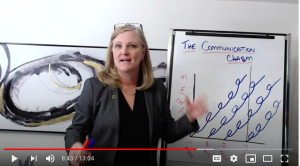The coronavirus has shown us how flat and how closely knit the world actually is. Images around the globe show the eerie impact on life and the economy. Messages of hope proclaim that we are all in this together.
While it’s true that we’re all in the same storm, we’re not all in the same boat.
As a senior leader in your company, you need to be hyperaware of the fact that life is probably quite different for you than it is for the rank and file. There are three key elements that make your situation very different from many, if not most, of the people in your organization. Missing any one of them could cause you to face rough water, but miss all three and you have a perfect storm.
In the aftermath of the storm, you could lose some of the trust and loyalty of your people. Productivity and morale can go down, and stress and resentment can go up. If this happens with enough people in your organization, you’ll have a hard time surviving this pandemic in the way that you hope you will. If your company survives, the reduced loyalty of your star performers can be a high price to pay. But you have the power to avoid all that trouble.
So, what are the elements of this perfect storm that make your boat so different?
- Control
- Cash
- Communication
CONTROL
When people feel as though they have lost control over their lives, their family’s lives, and their future, they spiral downward. And the loss of control doesn’t have to be complete for people to feel it. But you, on the other hand, likely have far more control than others.
How?
As a senior leader, you’re sitting in the crow’s nest at the top of the mast. You have the ability to see things from a broader perspective. You have first-hand knowledge of what the Board of Directors is thinking, or what your Head Office is planning. If you don’t have either of those things then you have even more control.
You know how many people will need to be let go, and you’re probably not one of them. You know if you’ll need to close a location, and it likely won’t be yours. You know how much cash the company has in reserves and if the company can, or will, change its focus to go online, manufacture a different product, or make some other pivot. Because you are at the very top, you are involved in making the decisions and while they are not decisions you would have wanted to make, you have a sense that you have some control over your destiny. And that control gives you confidence that helps you feel better about today, and about tomorrow.
Conversely, your employees are at the mercy of your decisions. You’re probably not communicating what you’re thinking because you don’t want to say anything until you have something to say. So, where does that leave everyone else? It leaves them in the dark, worried and scared.
In the absence of information, people make up their own story. If you’re not controlling the narrative, the rumour mill is.
 When going through change, we all go into self-preservation mode. We want and need, to understand how the change will impact us personally. And the downward spiral can happen quickly and dramatically. People can go from “working and schooling at home” to “divorced and living on the street” in the blink of an eye. Ridiculous, you say? Just watch. (click here for video evidence of the speed of the spiral) Then you’ll see what happens to morale, productivity, and customer service.
When going through change, we all go into self-preservation mode. We want and need, to understand how the change will impact us personally. And the downward spiral can happen quickly and dramatically. People can go from “working and schooling at home” to “divorced and living on the street” in the blink of an eye. Ridiculous, you say? Just watch. (click here for video evidence of the speed of the spiral) Then you’ll see what happens to morale, productivity, and customer service.
Bottom line: the control over your own future privileges you with confidence that others likely don’t share.
CASH
I remember years ago my father telling me to have one years’ worth of living expenses in the bank, just in case. It sounded good when he was saying it, but his opinion seemed esoteric.
As a senior leader, your salary is likely very healthy, and at a minimum, is higher than others in the company. You likely have more money available to you so when times are tight, you give up a few of your luxuries. Fewer trips abroad. Ribeye instead of cote de boeuf. No purchases from the vintage wine section.
Hunkering down during stay-at-home orders is relatively painless in your 5,000+ square foot home with a backyard gazebo complete with big screen tv and built-in BBQ. You’re happy to be home with your kids because the reality is that you could go an entire day and not see another living soul because you have so much space. Your biggest inconvenience could possibly be that the housekeeper has stopped coming and now you have to vacuum your own floors.
Why, you may ask yourself, aren’t people more appreciative of the opportunity to spend quality time at home with their family?
For some people, their 800 square foot apartment feels more like a dinghy than a yacht. Their office is the corner of the kitchen table and the computer power cord creates a danger zone for all when the kids run through chasing one another. Spouses are competing for internet speed to get their work done with the kids who want to stream the latest on Disney+. Possibly they even have to share a single-family computer so the arguments over whose turn it is can necessitate a chore-chart solution with the schedule taped to the refrigerator door.
There are others who live alone and the inability to hang out at Starbucks or spend time with friends and family on the weekend is truly the epitome of loneliness and isolation.
Those who live paycheque to paycheque are under duress because they just hope the paycheque keeps coming. The loss of any amount of income due to layoff or furlough can mean no new kids’ shoes for spring, even though they’re desperately needed. The panic that not having enough to make ends meet can cause the spiral I mentioned earlier to happen quicker and go deeper.
Bottom line: keep in mind that your cash reserves give you confidence in your ability to survive the crisis in comfort, that others probably don’t have.
COMMUNICATION
When I do transition management workshops, I talk about what I call the ‘communication chasm.’ People always find this to be very illuminating. I see heads nod, lips smile, and there is always one person who asks, “did you do this workshop for our senior leaders?” Why do they ask that question? Because they want their leaders to understand the huge gap between what they are feeling, and what those at the top are feeling. Let me explain.
Practically, and theoretically, the best way to communicate change, is top-down. In other words, the most senior leaders (Execs) discuss and make a decision and then they communicate it to the next layer down; let’s call them Directors. The Directors then figure out the impact on their department/division, and they plan their communication strategy to the next layer down; let’s call them Managers. The Managers then figure out the impact on the people on their teams that make up the rest of the organization; let’s call them staff.
What we also know is that when each person initially hears about the change, they start their own personal journey through the Phases of Resistance (PoR). (click here for video of me explaining Phases of Resistance). A PoR journey goes through a minimum of four phases; Denial, Anxiety, Exploring, and Motivated. This is a normal and natural response to dealing with change, and no one is exempt. Watch the video if you want to understand this better.
Without getting into too much detail, suffice it to say that the Execs (you) will begin their own PoR journey as they are making the decisions and planning the organizational rollout strategy. You now have the advantage of time because you were the first to know, and were the first to start your PoR journey.
Then, a month, a week, a day, or an hour later, you communicate to the Directors.
The Directors begin their PoR journey, and you continue with yours. More time goes by and the Managers are brought into the loop, and the same thing happens regarding the PoR journey; Managers start, Directors continue, Execs continue.
 Finally, it’s time to do the Town Hall where everyone else is read in. On the day of the Town Hall, consider where everyone is with regards to the PoR journey. Staff are just starting, Managers are working through, Directors may be close to the end, and Execs are likely done and on to the next thing. (click here for a video illustrating the Communication Chasm)
Finally, it’s time to do the Town Hall where everyone else is read in. On the day of the Town Hall, consider where everyone is with regards to the PoR journey. Staff are just starting, Managers are working through, Directors may be close to the end, and Execs are likely done and on to the next thing. (click here for a video illustrating the Communication Chasm)
So, what’s the point of all this. Well, if you’re already finished working through the mental journey and are on to the next thing, then when you communicate during the Town Hall, you are probably using language and a tone that is highly optimistic, energized, and excited about the opportunity that the change (or crisis, as in the case with COVID-19) brings.
Think about that bright, sunny disposition you bring to the meeting. Now think about your employees.
Once they hear the news, they have likely already started their self-preservation, downward spiral, and are worried about what this all means to them personally. And there you are, the one with the control and the cash, encouraging everyone to set sail for the brave new world.
Not everyone, but rest assured someone, in the audience, will be thinking you are out of touch, lack understanding and empathy, and that it’s just lip service when you say you’ll take care of them. Because there is such a huge chasm between what you’re feeling and what they’re feeling, you can come across as though you don’t care. And if they think you don’t care about them, that alone could sink you because they certainly won’t care about you.
Bottom line: keep in mind that you have had time to process it all and mentally move on at the same time as everyone else is at the beginning of a messy and sometimes difficult journey.
Put all three things together; your CONTROL, your CASH reserves, and the COMMUNICATION timeline, and you have the makings of a perfect storm.
Pay particular attention to what you say to people, and how you say it because while we’re all in the same storm, we’re NOT all in the same boat. And your inability to relate to the reality of the lives the people in your organization are living can absolutely sink you.

